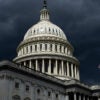The Dow Jones Industrial Average saw its biggest daily gain yesterday since March 2009, but Americans’ confidence in the economy has dropped to levels not seen since that same time period, according to a new Gallup poll.
Americans’ economic confidence plunged to -53 in the week ending Aug. 7, a level not seen since the recession days of March 2009. This deterioration coincided with the final wrangling over the U.S. debt ceiling and Standard and Poor’s downgrade of the United States’ debt rating. Economic confidence is now far worse than the -43 of two weeks ago and the -34 of a month ago.
U.S. economic confidence deteriorated even faster in July and the first week of August than it did in June compared with May. This plunge in confidence contrasts with the relatively flat trend in 2010. It also places consumer perceptions of the economy in the range of March 2009 during the recession.
The Daily Signal depends on the support of readers like you. Donate now
Americans don’t think the economy is getting any better, either. Gallup reports that 77 percent of Americans said the U.S. economy is getting worse, up from 71 percent two weeks prior and 64 percent a month ago. Meanwhile, a new Reuters/Ipsos poll shows that 73 percent of Americans believe the United States is “off on the wrong track.”
They’re justifiably concerned. Last month’s employment report shows that the economy is still weak, with just a slight improvement from the previous month’s disastrous report. The unemployment rate is at 9.1 percent, and the economy is hitting new, depressing lows. Heritage’s Rea Hederman, Jr. and James Sherk explain in a new paper that the average duration of unemployment hit a new record, surpassing 40 weeks for the first time ever. And the labor force participation rate (the percentage of working-age persons in an economy who are employed or who are unemployed but looking for a job) is 63.9 percent, the lowest level since 1984.
As Congress works to try to get America back on a solid fiscal path, Hederman and Sherk explain that there’s one thing they should not do: raise taxes.
The economy is at risk of falling into a second recession, and the deficit remains on an unsustainable path. As it deals with these problems, Congress should learn from the experiences of other countries. Congress should not attempt to cut the deficit by raising taxes. This often fails while significantly harming the economy.
Anti-deficit measures should instead be comprised largely or exclusively of spending reductions—particularly entitlement spending. The Heritage Foundation’s fiscal plan, “Saving the American Dream,” lays out a framework for Congress to balance the budget by lowering spending and reforming entitlements in ways that assure their survival. History shows that when governments follow such plans, economic growth does not weaken. The government should not do anything to hold the already weak economy back.
Read more of Hederman and Sherk’s paper “Heritage Employment Report: July Jobs Grow Slightly” at Heritage.org. For more solutions to America’s fiscal crisis, visit http://www.savingthedream.org/
































